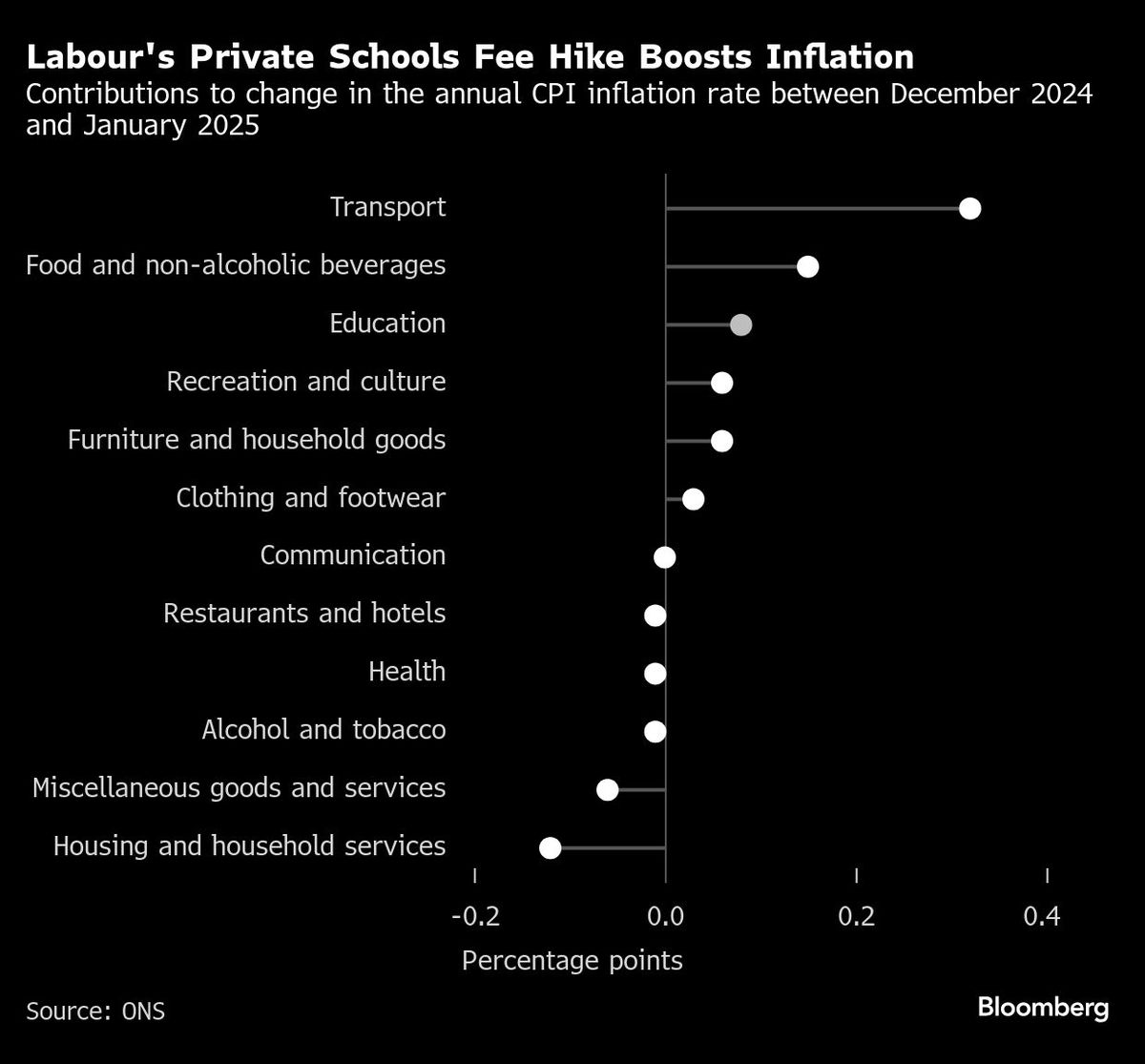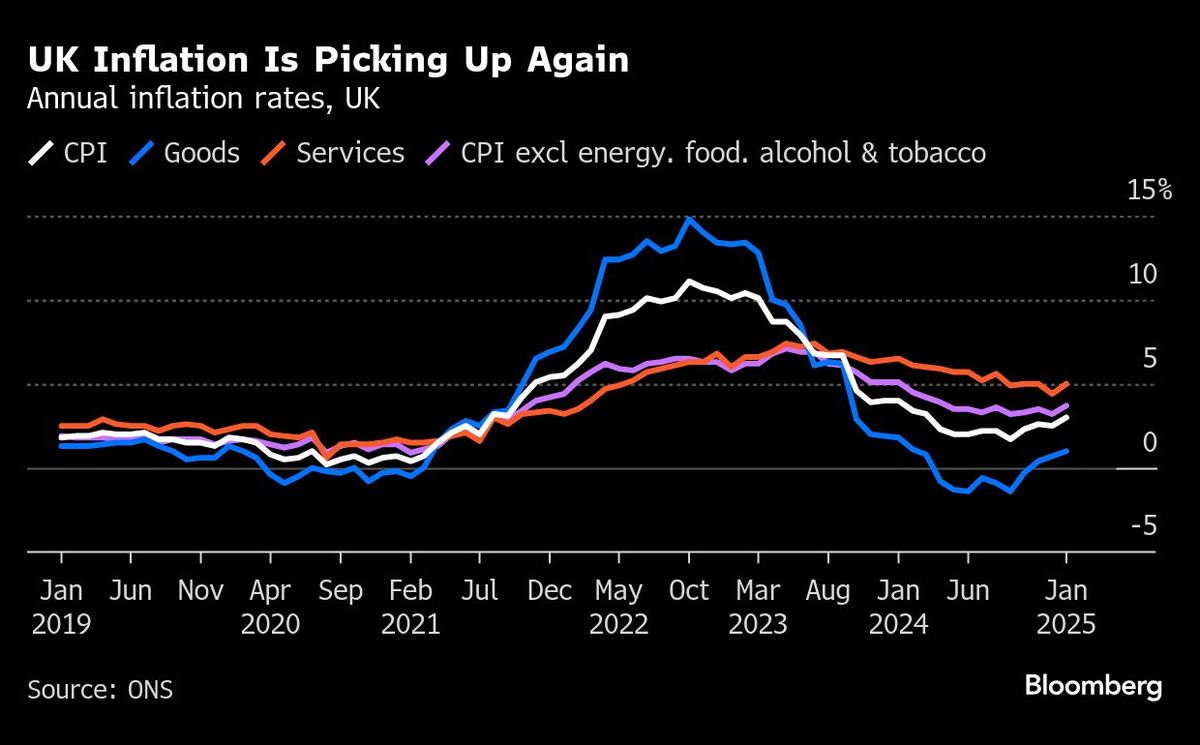
(Feb 19): UK inflation climbed to the highest level in 10 months in January, boosted by the cost of airfares, motor fuel, food and the imposition of value-added tax (VAT) on private school fees.
Consumer prices increased 3% from a year earlier, accelerating from a 2.5% pace in December, the Office for National Statistics (ONS) said on Wednesday. It was above the 2.8% forecast by economists and the Bank of England (BOE).
Traders responded by trimming rate-cut bets. They now see two more quarter-point reductions this year, a significant retreat since last week. Markets initially took comfort from lower-than-expected price growth in the services sector — which is being watched closely by the BOE for signs of domestically generated pressures. While it accelerated to 5% last month from 4.4%, the BOE had predicted services inflation of 5.2%.
The figures are likely to entrench caution at the BOE over cutting interest rates to support a moribund economy. While governor Andrew Bailey has played down the threat from an expected surge in inflation this year, officials say they can’t rule out “second-round effects” keeping underlying pressures higher for longer. The BOE expects inflation to peak at 3.7% in the third quarter on the back of energy costs.
Higher inflation makes a March interest rate cut by the BOE “improbable”, said Suren Thiru, an economics director at the Institute of Chartered Accountants in England and Wales. “These figures confirm a disheartening rebound in inflation, as rising airfares and the introduction of VAT on private school fees contributed to notably widen the gap with the bank’s 2% target.”
One driver of services inflation was the controversial introduction of 20% VAT on private school fees, a flagship policy of the Labour government designed to help fund improved public services. Fees rose almost 13% in January, lifting annual inflation in education to 7.5% — the highest in almost a decade. Another was airfares, which fell by much less last month than in January 2024, due to the timing of flights over Christmas and New Year.
Food inflation also jumped from 1.9% to 3.1%, driven by the cost of essentials such as meat, bread and cereals. Core inflation, which strips out volatile items like energy, food, alcohol and tobacco, rose to 3.7%, the highest since April.
“I know that millions of families are still struggling to make ends meet” despite the return of real wage growth, said Chancellor of the Exchequer Rachel Reeves.
Higher prices will be a worry for the Labour government, which has fallen sharply in the polls since its election last July. The Conservatives blame the £40 billion (US$50.5 billion or RM223.7 billion) of tax rises announced in the October budget for intensifying cost pressures for businesses and households.
The latest pickup pushes inflation away from the BOE’s 2% target, and is expected to be followed by further increases fuelled by energy bills later this year. On Tuesday, Cornwall Insight Ltd predicted another increase in the energy-price cap in April, marking a third consecutive quarter of rising gas and electricity bills for households.
However, the Monetary Policy Committee is also facing a stagnant economy, which has barely grown since Labour won power. That’s fuelling internal divisions, with two of its nine members voting for a bumper half-point cut earlier this month.
“The worst-case scenario for UK business is stagflation, combining high inflation and low growth,” said Roger Barker, the director of policy at the Institute of Directors. “January’s inflation figures have done little to mitigate the risk of this outcome.”
The central bank lowered interest rates by a quarter-point on Feb 6, the third cut since August, but warned that further reductions would be “gradual and careful”.
The case for a cautious approach was also supported by figures on Tuesday showing wage growth picking up to an eight-month high in the fourth quarter and the jobs market holding up stronger than expected. Tax data showed that the number of payrolled employees rose in January, and is down less than 20,000 since Labour’s first budget increase national insurance for firms and the minimum wage.
“Hot on the heels of strong wage data yesterday, this morning’s (Wednesday) hotter-than-expected inflation print will raise alarm bells at Threadneedle Street,” said Zara Nokes, a global market analyst at JPMorgan Asset Management. “This week’s data will cause quite the headache for the BOE, and raises questions about the decision to cut interest rates this month.”
The figures also showed signs of rising pipeline price pressures. Factory gate prices for goods before they reach retailers were up 0.3% in January, faster than the 0.1% forecast. Producer input prices of raw materials fell 0.1% in January, less than the 0.6% decline predicted.
Uploaded by Tham Yek Lee
- Gas pipeline blaze: Petronas Gas, Gas Malaysia’s shares open marginally lower after trading halt
- Gas pipeline blaze: MIDF flags potential RM18m impact to Petronas Gas
- T7 Global drops to two-year low, triggers short-selling halt after deputy chairman's departure
- Digital banks in Malaysia urged to re-examine strategies to better serve B40 segment
- Police to look into allegations that digging caused gas pipeline fire
- India’s Kotak targets US$2b for new private credit fund
- Trump’s bid to weaken China’s maritime heft may take ‘decades’
- China’s efforts to curb solar glut show limited impact — CEA
- Actor Val Kilmer, star of 'Top Gun' and 'Batman Forever', dies at 65 — report
- How Spain became big pharma’s new hotspot in Europe


